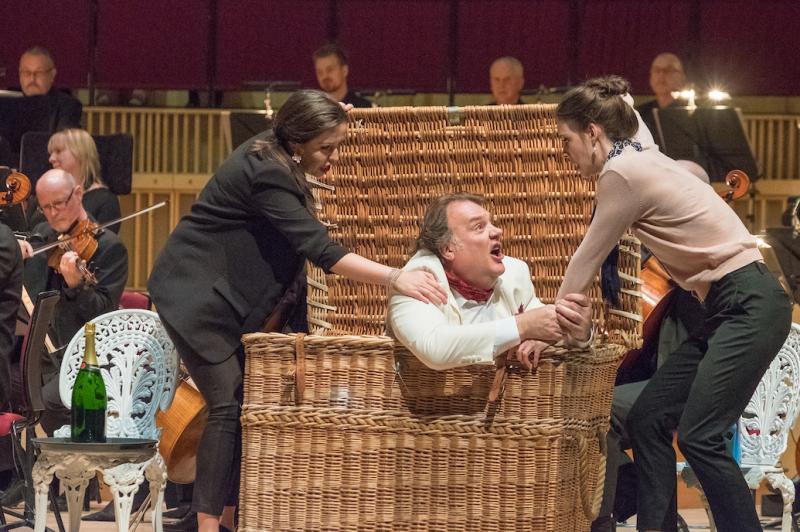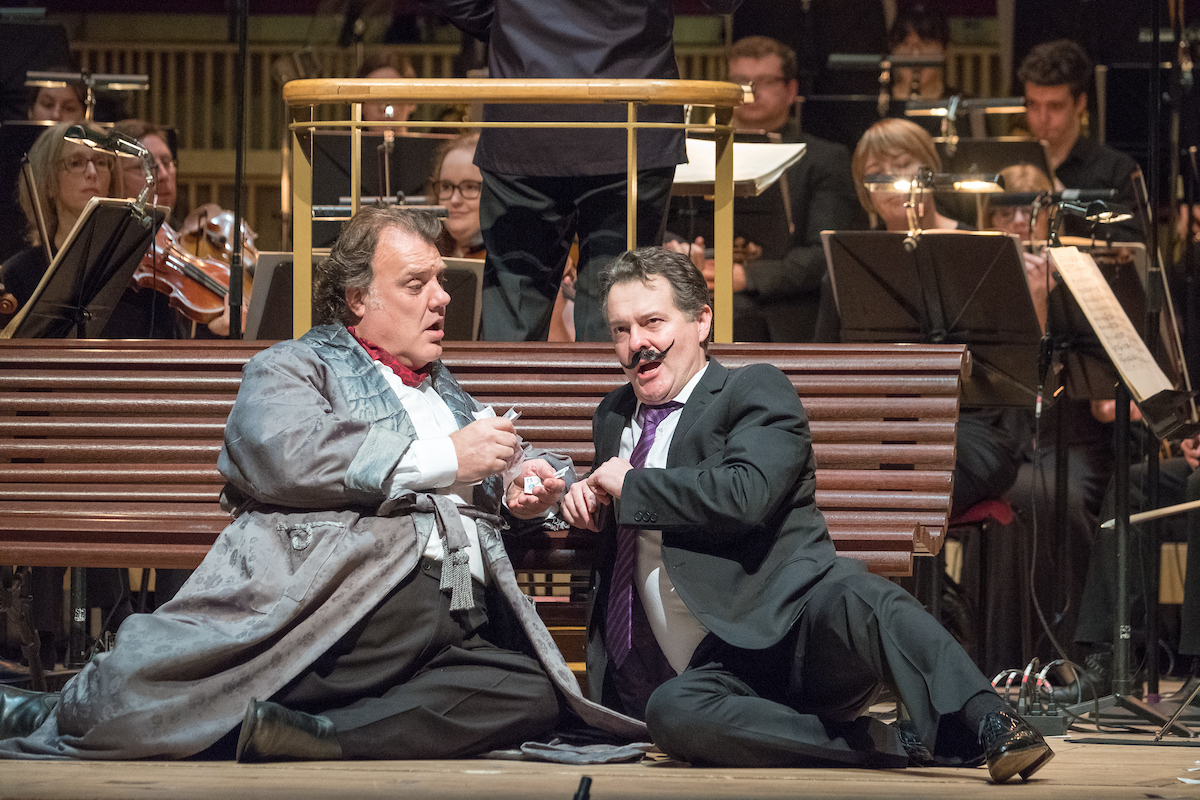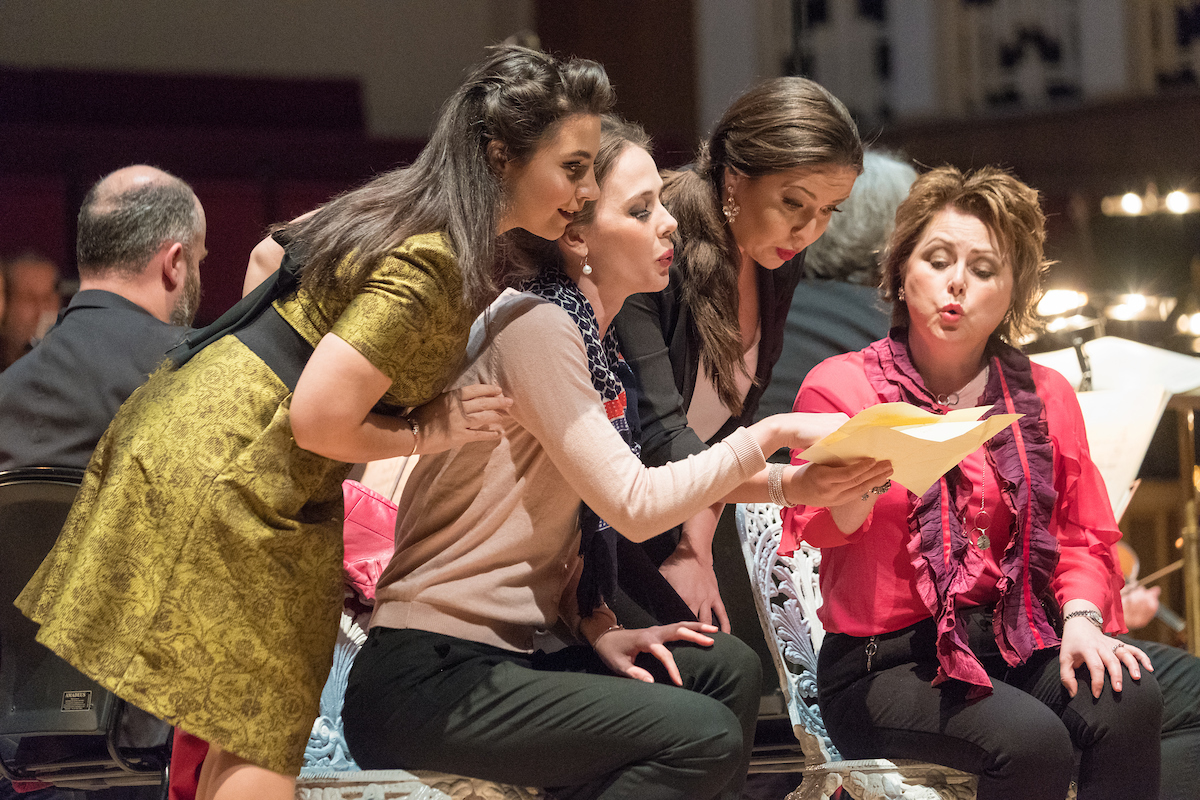Falstaff, RLPO, Petrenko, Liverpool Philharmonic Hall review - Bryn Terfel leads a merry dance | reviews, news & interviews
Falstaff, RLPO, Petrenko, Liverpool Philharmonic Hall review - Bryn Terfel leads a merry dance
Falstaff, RLPO, Petrenko, Liverpool Philharmonic Hall review - Bryn Terfel leads a merry dance
Two consummate one-to-ones crown generous, hit-and-miss Verdi

Even seemingly immortal singers grow old. Sir Bryn is closer to the "Martinmas summer" of Shakespeare's and Verdi's Sir John than when first he put on the fat suit at the Royal Opera 18 years ago. Even if he walks the gouty walk that matches the belly, vocally he seems richer than ever.
Not that Vasily Petrenko is quite the born opera conductor. He doesn't seem to relish every orchestral burp, titter and cheerful song that make his players equal partners in the action. Though he looks round occasionally to the singers, he rarely accompanies them so closely; that became immediately apparent when the jabbing that goes with Dr Caius's demand for an answer wasn't quite in sync with the singer (though tenor William Morgan worked alongside Max Zander's Bardolph and Lancelot Nomura's Pistol to serve up the righ comic side dishes).
The razor-sharp buoyancy that lifts the greatest of Falstaffs, the kind we've had from Abbado and Jurowski, only fitfully surfaced in orchestral passages (the uproar around "Va, vecchio John," for instance). But the Liverpool strings were a model of personality, forged by Petrenko over the years, from the brilliance of the tavern scenes to the exquisite fade of the Polonaise to which the Windsor folk anticipate the final gulling. And among the pleasurable details you don't always hear from the pit were the military trumpets when Falstaff tells the disguised Ford that "gold is a good captain that marches ahead". There are always new things to hear in this treasure-trove of a score.Lovely cor anglais playing, too, from Anna Wheal. Two scenes worked as well as I've ever heard them, with Act Two Scene One's visitors to the Garter Inn. Young Polish mezzo Wanda Franek may well be the most voluptuous Mistress Quickly the opera has ever seen; most important, she has the comic chest tones for "reverenza" and "povera donna". With time, could she become the Amneris and Azucena the world so badly needs? And I've never seen baritone Mark Stone (pictured above with Terfel), stepping in for Anthony Clark Evans, give a better performance than this Ford; it's no small order to match Terfel for tone and character, but his energised acting was absolutely up to the mark and the jealousy aria gave the biggest goosebumps in the show.
Two scenes worked as well as I've ever heard them, with Act Two Scene One's visitors to the Garter Inn. Young Polish mezzo Wanda Franek may well be the most voluptuous Mistress Quickly the opera has ever seen; most important, she has the comic chest tones for "reverenza" and "povera donna". With time, could she become the Amneris and Azucena the world so badly needs? And I've never seen baritone Mark Stone (pictured above with Terfel), stepping in for Anthony Clark Evans, give a better performance than this Ford; it's no small order to match Terfel for tone and character, but his energised acting was absolutely up to the mark and the jealousy aria gave the biggest goosebumps in the show.
The other experienced trouper, Terfel's fellow Welsh singer Rebecca Evans (pictured below on the right with Barbara Massaro's Nannetta, Franek and Anna Dowsley), produced the ideal expansive phrasing for Alice Ford's mockery of her "shining star" over lecherous Falstaff in an otherwise not quite crisp enough first ensemble scene - there seemed to be a bit of wrong-footing in Act 2 Scene 2's "gaie comare di Windsor", too - and her sense of fun was ideal for the merriest of wives; Australian Anna Dowsley still did what she could as the ever-overshadowed Meg Page. Where youth mattered most, it didn't quite shine. Barbara Massaro needs to pull the core tone into focus, though she floated some of Nannetta's top notes rather well; Turkish tenor Murat Can Guven should be useful in less nuanced tenor roles than the scrupulous-sensitive Fenton, whose Windsor Forest solo lacked moonshine (not so Timothy Jackson's magical offstage horn). Petrenko took their two little duets in their first scenes together too ponderously.
Where youth mattered most, it didn't quite shine. Barbara Massaro needs to pull the core tone into focus, though she floated some of Nannetta's top notes rather well; Turkish tenor Murat Can Guven should be useful in less nuanced tenor roles than the scrupulous-sensitive Fenton, whose Windsor Forest solo lacked moonshine (not so Timothy Jackson's magical offstage horn). Petrenko took their two little duets in their first scenes together too ponderously.
There was enough fun in Lane's staging, complicit with lively side-titles, to have the audience constantly laughing out loud, and Terfel gallery of gags kept it focused. Fine-tuning might have included a fuller basket of laundry - and what there was, it should have been remembered, is dirty, so hardly much point in folding it up. And couldn't the "fairies" have been allowed to really pinch and poke the horned Falstaff?
Tim Baxter's videos high on the back wall had lots of charm, not least in painting pretty nature-scenes that had us yearning for spring and summer, and came together with the lively young chorus's twinkling lights in the final scene. And yes, this sent us out feeling much better than we'd come in, though with a masterstroke of a caution in Falstaff's piano solo "tutti gabbati" ("all are mocked") before the final joyous blaze of the great fugue; only a charisma as big as Terfel's could have held the audience in the silence around that the way he did.
rating
Share this article
Add comment
The future of Arts Journalism
You can stop theartsdesk.com closing!
We urgently need financing to survive. Our fundraising drive has thus far raised £49,000 but we need to reach £100,000 or we will be forced to close. Please contribute here: https://gofund.me/c3f6033d
And if you can forward this information to anyone who might assist, we’d be grateful.

Subscribe to theartsdesk.com
Thank you for continuing to read our work on theartsdesk.com. For unlimited access to every article in its entirety, including our archive of more than 15,000 pieces, we're asking for £5 per month or £40 per year. We feel it's a very good deal, and hope you do too.
To take a subscription now simply click here.
And if you're looking for that extra gift for a friend or family member, why not treat them to a theartsdesk.com gift subscription?
more Opera
 The Railway Children, Glyndebourne review - right train, wrong station
Talent-loaded Mark-Anthony Turnage opera excursion heads down a mistaken track
The Railway Children, Glyndebourne review - right train, wrong station
Talent-loaded Mark-Anthony Turnage opera excursion heads down a mistaken track
 La bohème, Opera North review - still young at 32
Love and separation, ecstasy and heartbreak, in masterfully updated Puccini
La bohème, Opera North review - still young at 32
Love and separation, ecstasy and heartbreak, in masterfully updated Puccini
 Albert Herring, English National Opera review - a great comedy with depths fully realised
Britten’s delight was never made for the Coliseum, but it works on its first outing there
Albert Herring, English National Opera review - a great comedy with depths fully realised
Britten’s delight was never made for the Coliseum, but it works on its first outing there
 Carmen, English National Opera review - not quite dangerous
Hopes for Niamh O’Sullivan only partly fulfilled, though much good singing throughout
Carmen, English National Opera review - not quite dangerous
Hopes for Niamh O’Sullivan only partly fulfilled, though much good singing throughout
 Giustino, Linbury Theatre review - a stylish account of a slight opera
Gods, mortals and monsters do battle in Handel's charming drama
Giustino, Linbury Theatre review - a stylish account of a slight opera
Gods, mortals and monsters do battle in Handel's charming drama
 Susanna, Opera North review - hybrid staging of a Handel oratorio
Dance and signing complement outstanding singing in a story of virtue rewarded
Susanna, Opera North review - hybrid staging of a Handel oratorio
Dance and signing complement outstanding singing in a story of virtue rewarded
 Ariodante, Opéra Garnier, Paris review - a blast of Baroque beauty
A near-perfect night at the opera
Ariodante, Opéra Garnier, Paris review - a blast of Baroque beauty
A near-perfect night at the opera
 Cinderella/La Cenerentola, English National Opera review - the truth behind the tinsel
Appealing performances cut through hyperactive stagecraft
Cinderella/La Cenerentola, English National Opera review - the truth behind the tinsel
Appealing performances cut through hyperactive stagecraft
 Tosca, Royal Opera review - Ailyn Pérez steps in as the most vivid of divas
Jakub Hrůša’s multicoloured Puccini last night found a soprano to match
Tosca, Royal Opera review - Ailyn Pérez steps in as the most vivid of divas
Jakub Hrůša’s multicoloured Puccini last night found a soprano to match
 Tosca, Welsh National Opera review - a great company reduced to brilliance
The old warhorse made special by the basics
Tosca, Welsh National Opera review - a great company reduced to brilliance
The old warhorse made special by the basics
 BBC Proms: The Marriage of Figaro, Glyndebourne Festival review - merriment and menace
Strong Proms transfer for a robust and affecting show
BBC Proms: The Marriage of Figaro, Glyndebourne Festival review - merriment and menace
Strong Proms transfer for a robust and affecting show
 BBC Proms: Suor Angelica, LSO, Pappano review - earthly passion, heavenly grief
A Sister to remember blesses Puccini's convent tragedy
BBC Proms: Suor Angelica, LSO, Pappano review - earthly passion, heavenly grief
A Sister to remember blesses Puccini's convent tragedy

Comments
Such a wonderful production!
Corrected, with thanks.
Corrected, with thanks.